Project
Short-term rentals fear restrictions
Published
10 months agoon
Investors in Ho Chi Minh City who provide short-term apartment rental services are at risk of being fined or losing their deposits under a strict new ban.
 |
| Some apartment or homestay operators have spent thousands of US dollars on their accommodations, Photo: Shutterstock |
Ho Chi Minh City People’s Committee has banned daily and hourly accommodation rentals on apartment buildings, except for mixed-use complexes including apartments for renting to official tourists.
Decision No.26/2025/QD-UBND dated February 27 provides stricter regulations on the operation of apartment buildings which were licensed for residential only. The decision guides that for apartment buildings with the sole purpose of use for residence, the apartment rental must have a contract signed between the apartment owner and the person in need of renting, the rental purpose must be established for residence only, not for tourism renting.
With the number of apartment towers soaring in recent years in Vietnam’s biggest city, many owners lease their properties exclusively to short-term renters, having the higher yield.
According to real estate expert Tran Khanh Quang, apartments for rent on the market are currently divided into two segments. “Average qualified apartments with the prices from $80,000-120,000 per unit are not affected by this ban because this segment is suitable for long-term rental, with the yield from 4-5 per cent per year,” Quang said.
“Meanwhile, investors renting out mid- to high-end apartments, with prices from $120,000-200,000 per unit, are facing difficulties. Because this type of apartment is mainly located in the central area, short-term rental business will bring higher profits, with the yield from 5-6 per cent per year,” added Quang.
In Hanoi, where short-term rentals remain legal for now, property owners are watching closely. Many fear Ho Chi Minh City’s policies could soon extend to the capital (see below).
Le Quoc Tuan, who operates a homestay in Hanoi’s Hoan Kiem district, worries that blanket restrictions will disrupt an industry that caters to short-term travellers. “The majority of my guests stay for just two or three nights, either for leisure or business,” said Tuan. “Without that demand, sustaining our business model will be incredibly difficult.”
Long-term leasing is not a practical alternative for many homestay owners. Unlike traditional landlords, they have invested heavily in designing short-term accommodations, from high-end furnishings to curated guest experiences. The pivot to longer stays would require an entirely different business model.
The popularity of short-term services has also resulted in conflict between short-term tenants and long-term residents. According to Mai Hoang, a resident living in Gold View Buildings in District 4 of Ho Chi Minh City, short-term guests usually make more noise at night because of late arrivals, karaoke, or drinking.
“They bother us a lot, especially the older people who need more quiet time to relax, as well as others after the working day,” Hoang said.
Tran Minh Ai, senior director of Property Management for Savills in Ho Chi Minh City, commented that this decision was considered necessary to more closely manage apartment rental activities, returning the living environment to residents in apartment buildings for residential purposes only.
Ai added that in Ho Chi Minh City, many opinions have been recorded recently because the Law on Housing 2023 mentioned that apartments can only be used for living in.
“However, there are still controversies about whether short-term rentals can be called living or tourist accommodation. This new decision has clarified the information and is consistent with the provisions of the law, creating conditions for management units in supervision, while limiting the shortcomings of the short-term rental model in apartments, ensuring amenities and living environment for residents,” Ai said.
In apartment buildings in District 4, such as Icon 56, The Tresor, Milelium, Gold View, their operating boards do not allow short-term tenants to rent the apartment. This move has put many Airbnb service investors in a difficult place.
Manh Dat, director for Minh Dat Real Estate, who uses the Airbnb platform for renting, said he has been doing business in short-term rental for nearly 10 years and was renting out nearly a hundred apartments in many projects in Thu Duc city, Binh Thanh district, District 7, and Phu Nhuan district.
“Most of the apartments being operated are rented from the owners, with monthly costs ranging from $600-1,000 per month,” Dat said.
According to Dat, the short-term rentals are easier to draw in guests and generate better income than long-term rentals, with revenue from renting an apartment sometimes reaching $2,000-2,400 per month. “With the ban, we are at risk of losing thousands of US dollars each month, bearing contract termination and losing deposits from customers who have booked in advance,” Dat said.
Meanwhile, individual investor Hoang Mai said that she had spent hundreds of thousands of US dollars with bank loans to buy two apartments in District 7 to carry out Airbnb rentals. In addition, Mai also spent nearly $40,000 for furniture, design, cleaning services, repairs, and advertisements.
“The investment amount is not small, but I have not received much return before the ban. This is the family’s main source of income, used to pay the bank and normal services. If the management board requests, I will switch to long-term rental, but the profit from long-term rental is not as good, it is difficult to find customers, and I am afraid it will be difficult to recover the capital,” she said.
In addition, if short-term rentals cannot be exploited, some investors will find ways to sell their products. This increases the number of apartments on the secondary market.
Vo Hong Thang, deputy general director of DKRA Group, said that this ban would not affect tourism activities or the local economy because the market did not lack alternative products such as hotels, serviced apartments, and individual homestays.
“However, this movement will affect the liquidity of the apartment segment as well as the profits of investors. In fact, in many apartment projects that once strictly prohibited short-term stays, rental prices have subsequently decreased by 15-20 per cent,” Thang said.
| Dinh Xuan Kien, owner, Phen Homestay Hoan Kiem district, Hanoi
Currently, the majority of my homestay guests prefer short-term stays, typically between two and three days, to enjoy their travels, explore the local area, and experience a comfortable living space. This group constitutes my primary source of revenue, as is the case for many other homestay businesses. Meanwhile, demand for long-term rentals remains relatively low, as long-term tenants often opt for traditional apartments or private houses for greater stability and convenience. Therefore, if the short-term rental ban is enforced in Hanoi, I believe it will cause significant losses. It will not only directly impact my business but also negatively affect the entire homestay sector, which heavily relies on short-term travellers. Moreover, this regulation could place many homestay owners in a difficult situation, having invested significantly in renovations and furnishings but being unable to operate their businesses as intended. Restricting short-term rentals may reduce the appeal of this accommodation type, making the homestay market less vibrant and affecting the income of many individuals and businesses in the tourism and hospitality industry. Pham Van Tien, owner, The Happy Stay I have invested approximately $20,000 in renovating and furnishing my homestay apartment, covering infrastructure repairs, interior decoration, and essential furniture purchases. This investment was made with the expectation of generating a stable rental income. However, if Hanoi enforces a short-term rental ban, I anticipate a financial loss of around $800 per month. This would not only disrupt my income stream but also leave me struggling to maintain the apartment without any return on investment, ultimately affecting my ability to reinvest and ensure proper upkeep in the long run. Moreover, as I operate under a long-term lease agreement with the landlord, the ban would have even broader implications. Losing the ability to legally rent out the apartment for short-term stays means I risk forfeiting my deposit of $2,400 and being locked into an unviable contract. This situation would create significant financial strain, making it difficult to recover my initial investment while still being responsible for ongoing rental costs. To address security concerns, which are one of the main reasons behind the ban, I have already implemented strict guest screening measures. Every tenant is required to provide full personal information, and I conduct thorough security checks before allowing check-ins. Additionally, I frequently monitor the apartment’s surroundings and enforce clear regulations on guest behaviour to minimise disruptions to permanent residents. If needed, I am also open to organising safety awareness sessions for guests to further enhance security within the building. Le Viet Anh, owner, Homestay apartment Tay Ho district, Hanoi I currently rent apartments from landlords under long-term leases of one to three years, with security deposits of around $3,200 to $4,000 per unit. If the ban takes effect, I won’t be able to continue my business, leading to major financial losses. I would lose my deposits, along with the money I’ve spent on renovations and furnishings. On top of that, I might also have to pay penalties for breaking my lease agreements, making the financial hit even worse. I understand concerns about security and disturbances caused by short-term rentals and have already implemented strict measures to ensure guest quality and safety. These include verifying guest identities before check-in, installing security cameras at entry points, and restricting access to only registered guests. Moreover, I enforce strict rules on check-in times, guest capacity, and guest behaviour to minimise disturbances to permanent residents. I also work closely with building management to comply with all regulations and address any concerns from other residents. Rather than imposing a complete ban, I hope there will be a more flexible regulations that balance security concerns with business sustainability. One approach could be issuing conditional operating licences, allowing homestay businesses to operate under strict security and guest management standards. Another solution could be permitting short-term rentals within regulated timeframes to reduce disruptions in residential buildings. |
You may like
-
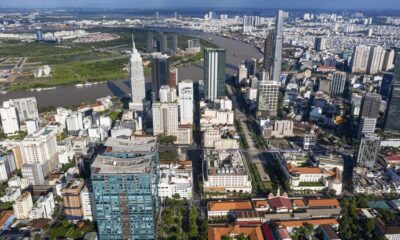

Ho Chi Minh City apartment prices hit record highs
-
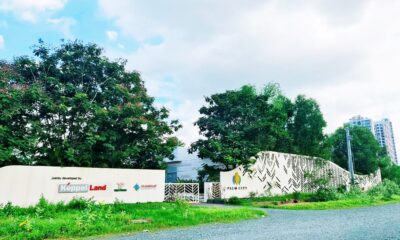

Keppel unlocks $104 million with divestment from Palm City
-
HoREA proposes letting manufacturers build worker housing in IPs
-
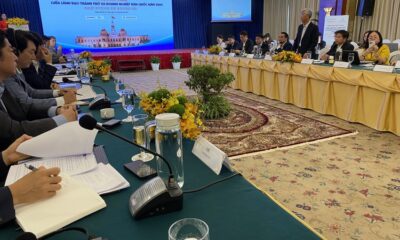

Korean investors raise key concerns in Ho Chi Minh City dialogue
-


Ethiopian Airlines to launch new passenger service to Hanoi from July
-
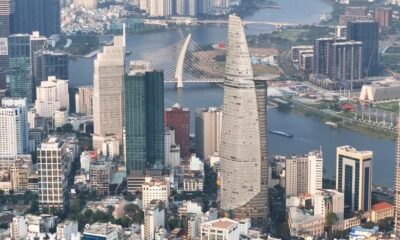

Vietnam should be flexible in selecting financial centre models: expert
Project
Vietnam’s Exclusive Economic Zone boasts over 1,000 GW of wind power potential: report
Published
10 months agoon
April 27, 2025Vietnam’s Exclusive Economic Zone (EEZ) has a wind power potential of 1,068 GW, nearly 470 GW more than previously estimated, according to a report released Friday by the National Center for Hydro-Meteorological Forecasting (NCHMF).

An offshore wind power project in Vietnam. Photo courtesy of VnEconomy.
The report, titled “Detailed Assessment of Wind Resource Potential in Coastal (up to 6 Nautical Miles) and Offshore Areas in Vietnam,” was conducted by the NCHMF with support from the United Nations Development Program (UNDP) and the Norwegian Embassy.
This wind potential was measured at a height of 100 meters above sea level, said Mai Van Khiem, director of the NCHMF. He noted that from November to February each year, wind capacity accounts for half of the annual total – peaking in December and gradually decreasing, with the lowest levels recorded in May.
The southern offshore areas account for 894 GW of this potential, while the northern areas contribute 174 GW.
In nearshore zones (up to 6 nautical miles), the total technical wind power potential is 57.8 GW. The Bac Lieu-Ca Mau region alone contributes nearly 30% of this, while the Ninh Thuan-Binh Thuan area accounts for 24 GW. Although the Quang Tri-Hue region has lower potential, it offers stable wind speeds during the winter months. The Red River Delta has a modest potential of 0.17 GW.
Compared to previous assessments, such as the World Bank’s 2021 study and data from the Global Wind Atlas (GWA), this report provides more detailed and higher-resolution information, both spatially and temporally.
“Notably, the EEZ potential outlined in this report exceeds the World Bank’s estimate by 469 GW, primarily due to the broader scope of the survey and more refined climate modeling using domestic observational data,” the research team explained.
They also emphasized the use of the Weather Research and Forecasting (WRF) model customized specifically for Vietnam, which enhanced the accuracy of the results.
The findings are based on wind data collected from 26 coastal and island meteorological stations, satellite sources from CCMP, ASCAT, and SCATSAT-1 (covering 30 years of ocean surface wind data), as well as buoy data from Nghe An province and seabed depth measurements.
A key innovation in this report is the integration of potential impacts from extreme weather events. Typhoons and tropical depressions occurring between August and October pose structural and safety risks to wind turbines. Meanwhile, strong winds and high waves during the northeast monsoon season can hinder access to and maintenance of offshore wind systems.
To support model calibration and long-term observation, the research team recommends increased investment in offshore wind monitoring stations at heights exceeding 100 meters. They also suggest incorporating these findings into offshore wind development strategies and national marine spatial planning.
Additionally, the team advocates for expanding research into other forms of marine renewable energy, such as wave, tidal, and ocean thermal energy.
“Vietnam has some of the most promising offshore wind resources in the region, creating a strong foundation for the development of a large-scale offshore wind industry. This will contribute to energy security, green economic growth, and the achievement of net zero commitments,” they said.
The study provides a vital scientific basis for policy planning, identifying priority development zones, attracting investment, building infrastructure, and training the future offshore wind workforce, the team added.
Hoang Duc Cuong, deputy director of the Department of Meteorology and Hydrology, emphasized that Vietnam lies within a strong and stable Asian monsoon belt, giving it abundant wind energy potential. He noted that this renewable source will play a key role in meeting the country’s climate change goals and advancing a low-carbon economy.
However, he also warned that marine-based natural disasters are highly complex and could significantly impact the stability of offshore wind operations and energy generation.
The ever-changing status of the global economy following last week’s tariff shocks continue to loom large among investors in Vietnam’s real estate market.
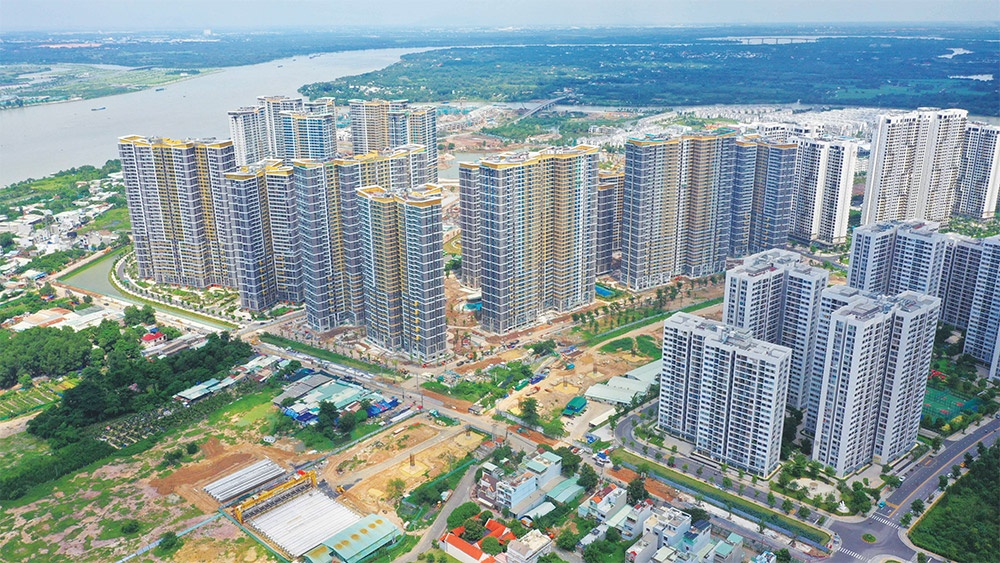 |
| All real estate segments are at risk of losing appeal if high global tariffs are eventually put in place, photo Le Toan |
Pham Lam, vice chairman of the Vietnam Real Estate Association, said that while it is premature to determine the full impact of new US import tariffs on Vietnam’s property market, early signs point to shaken investor sentiment and potential disruptions to foreign investment.
“If multinational corporations scale back or delay their factory expansion plans, the demand for land and factory leasing could decline, which may place downward pressure on industrial rents, lead to increased vacancy, and postpone new industrial zone developments,” he said. “This would affect key industrial property markets such as Bac Ninh, Bac Giang, Haiphong, Long An, and Binh Duong.”
Meanwhile, real estate expert Nguyen Hoang said that the United States remains one of the most critical export destinations for Vietnam’s foreign-invested enterprises.
“Any change in tariffs will significantly influence capital flows, investor confidence, and manufacturing strategies of companies operating in Vietnam. If a high tariff is fully implemented in 90 days, it could seriously diminish Vietnam’s investment appeal – affecting all real estate segments as a result,” Hoang said.
Vietnam’s property market has only recently emerged from a prolonged two-year downturn.
“It remains highly sensitive to economic and policy shocks. Investors have remained cautious, and any further external pressure could threaten to break the fragile liquidity recovery, potentially sending the market back into a period of short-term stagnation,” Hoang added.
Alex Crane, managing director of Knight Frank Vietnam, said that the recent tariff twists by the US casts a shadow of uncertainty, with potential implications for various segments of the market.
While manufacturing has shown resilience, it is still on the path to full recovery from the pandemic, particularly in labour-intensive sectors like garments and furniture. Tariffs imposed now would not have as severe an impact as they might have during Vietnam’s 2019 peak, but consequences are still expected, Crane said.
“I may expect that major transactions, especially those involving large capital outlays, are being paused or undergoing extended due diligence as investors and developers reassess assumptions and underwriting models and commercial occupiers are expected to defer large capital expenditures in the short term,” Crane said.
In addition, the response from the State Bank of Vietnam, particularly regarding monetary policy, will be crucial. While a rate cut may not effectively stimulate residential demand (as demonstrated in 2024), targeted lending for key industries and easing of loan-to-value ratios or debt-to-income limits for developers could provide relief.
“At present, most segments of the real estate market are in a holding pattern, awaiting clarity from the evolving negotiations between the Vietnamese and US governments. While uncertainty is unsettling, Vietnam’s underlying fundamentals remain sound, and the market’s long-term outlook is still viewed positively,” he added.
Nguyen Dung Minh, deputy CEO of MIK Group, has warned that under the new US tariff regime, many investors will be forced to reassess their strategies, likely leading to a decline in the demand for industrial land.
“Investors will need time to re-evaluate their actual demand and incoming orders and make necessary adjustments before they can fully gauge the extent of the impact,” Minh said.
He added that the implications go beyond just industrial land. “The new US tariffs are also expected to disrupt supply chains and negatively affect supporting sectors such as logistics, warehousing, and raw materials manufacturing. As production slows, so too will the demand for land associated with these services,” Minh said.
| Trang Bui, country head Cushman & Wakefield Vietnam
While the effects of tariffs are typically delayed, most economists warn that they may eventually fuel inflation and dampen economic growth. Many manufacturing firms could opt to postpone their expansion plans in the short term if export duties become too burdensome. There is also a possibility that some companies may look to diversify their supply chains towards a Vietnam+1 model, shifting parts of their operations to neighbouring countries. This could lead to a decline in demand for factories and warehouse leasing, two key drivers of the industrial real estate segment. However, it is important to recognise that industrial real estate is fundamentally a long-term investment. Vietnam has long positioned itself as the manufacturing hub of Southeast Asia, thanks to its strategic location and the “bamboo diplomacy” approach, which has enabled the country to swiftly join trade negotiations and sign multiple free trade agreements. Moreover, many manufacturers in Vietnam have already established tightly integrated supply chains. As such, their investment plans tend to operate on a much longer time horizon than the near-term effects of tariff policy. Relocating supply chains typically requires at least 3–5 years, making short-term shifts less likely. Overall, Vietnam’s industrial real estate sector has proven resilient under various political and economic conditions. Investors would do well to focus on long-term trends and structural advantages. Manufacturers, in particular, may take this opportunity to secure high-quality industrial assets, invest in automation, and pull in skilled labour, while continuing to monitor developments in upcoming trade negotiations with caution. Nguyen Thi Bich Ngoc, CEO, Sen Vang Group When it comes to the reciprocal tariff policy announced by the US, the greater danger currently lies not in the tariff itself, but in the heightened sense of uncertainty it has triggered across the Vietnamese market, a sentiment clearly reflected in recent VN-Index fluctuations. In the short term, the policy will weigh heavily on Vietnam’s industrial real estate sector. However, in the long run, this challenge could serve as a catalyst for stronger growth. It presents an opportunity for the government and industrial zone developers to rethink their strategies, offering more competitive, attractive solutions to both foreign and domestic investors. Rather than relying solely on external trends like the China+1 shift, Vietnam should leverage its inherent competitive advantages, including a strategic geographic location, a skilled and cost-effective labour force, and political stability, to pull in long-term investment. These are undeniable strengths that set Vietnam apart. Moreover, this is also an opportune moment for Vietnam to re-evaluate and restructure its key sectors, prioritising strategic industries with high growth potential. Continued engagement in bilateral and multilateral trade agreements will open up new opportunities and elevate Vietnam’s position both regionally and globally. Ultimately, we must seize this challenge as a turning point, transforming pressure into momentum for sustainable development. Vo Hong Thang, Investment director DKRA Group The industrial infrastructure, commercial, and residential real estate segments are all likely to face increasing headwinds if a huge tariff increase is eventually implemented. In recent years, a number of developers have made significant investments in industrial zones, betting on a continued influx of foreign direct investment. However, the new tariff policy raises the possibility of such flows being diverted to other countries. Vietnam now faces the risk of having built the nest, but being unable to attract the eagle. In addition, liquidity in both residential and commercial real estate, including retail, office, and hospitality, is likely to weaken in the short term due to more cautious investor sentiment, defensive capital flows, and reduced purchasing power from end-users. Niche investment segments such as serviced apartments, tourism-related accommodations, and foreign buyer housing could also see demand drop, particularly as the foreign expert and executive workforce, typically a key demand driver, scales back plans to live and work in Vietnam. |
Project
Central Vietnam city seeks $1.84 bln for 15 projects in economic zone
Published
10 months agoon
April 26, 2025Authorities of Hue city in central Vietnam have released a list of 15 projects in Chan May-Lang Co Economic Zone which will need VND47.5 trillion ($1.84 billion) in investment capital between 2025 and 2026.
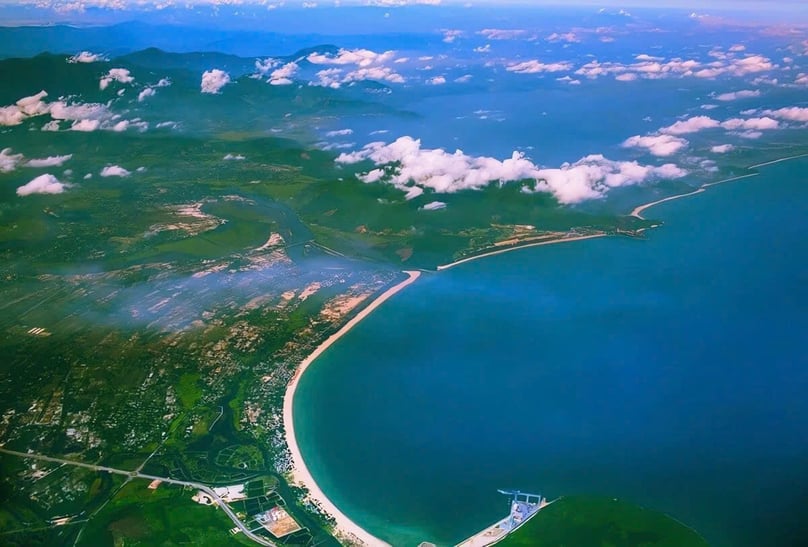
Chan May-Lang Co Economic Zone in Hue city, central Vietnam. Photo by The Investor/Dinh Duy.
Notable projects include the Chan May non-tariff zones No. 1 and 2 infrastructure development project, with a total area of over 503 hectares and combined investment capital of VND2.8 trillion ($108.23 million).
Another is the VND20 trillion ($773 million) Chan May Urban Area project (locations 1 and 2), which will cover 225 hectares and be implemented over five years.
The LNG terminal project at Chan May Port, 27 hectares with an investment of VND8.6 trillion ($332.43 million), is set for five-year implementation.
The 120-hectare Bai Ca eco-tourism project in Lang Co township will have investment capital of VND2.5 trillion.
The Lang Co beach resort, with an area of 45 hectares and total investment of VND4 trillion ($154.62 million), will be carried out over five years; while the 75-hectare Lap An lagoon tourism, urban development and resort complex in Lang Co township will cost VND6 trillion.
According to the management board of Hue Economic and Industrial Zones, since its establishment, Chan May-Lang Co Economic Zone has attracted 55 investment projects which remain valid, with total registered capital of VND97.32 trillion ($3.76 billion).
Among these, 15 are foreign-invested projects with combined capital of VND56.02 trillion ($2.17 billion), accounting for 57.56% of the total.
Several prominent foreign investors have established a presence in the zone, such as Banyan Tree Group (Singapore) with the Laguna Lang Co Resort and Winson Group (Taiwan) with the Billion Max Vietnam Export Processing Factory.
Chan May-Lang Co has become a destination for investments in sectors like tourism and resort development; seaport infrastructure; logistics; clean industry; and high-tech, environmentally friendly industries, with annual revenue reaching nearly VND4 trillion ($154.62 million) and tax contributions of around VND300 billion.
The management board said Hue city has proposed the Ministry of Construction review the adjustment of the EZ master plan through 2045, for submission to the Prime Minister.
The strategic goal is to develop Chan May-Lang Co into a key economic zone of central Vietnam – a coastal gateway offering logistics services for the central region and the East-West Economic Corridor, as well as a hub for high-end tourism services.
To attract investors, the local government will offer a range of incentives such as a 10% corporate income tax rate for 15 years from the first year the project generates revenue; import tax exemption for goods to create fixed assets for investment projects, and land and water surface rental exemptions, the board said.

Bac Giang International Logistics Centre launched

Vietnam’s Exclusive Economic Zone boasts over 1,000 GW of wind power potential: report

Uncertainty weighing on real estate

Central Vietnam city seeks $1.84 bln for 15 projects in economic zone

